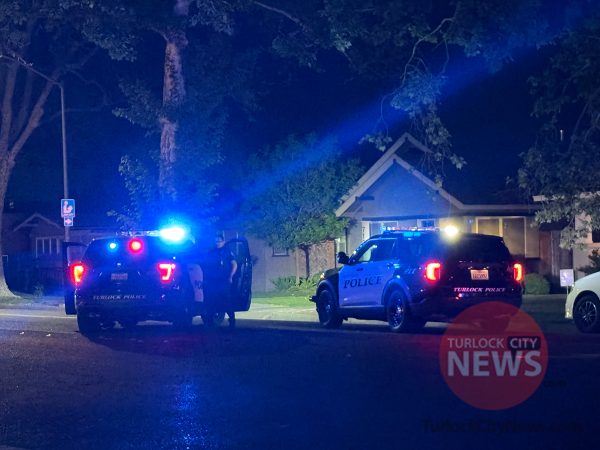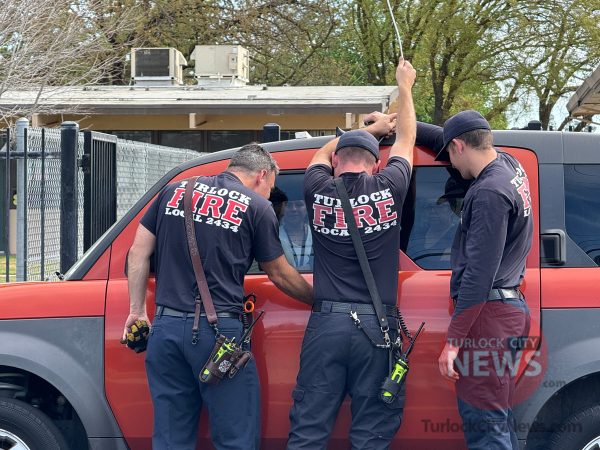The Turlock City Council is moving forward with plans to place a road tax on the November ballot, and may put a little “skin in the game” by self-funding some road repairs.
By a 4-1 vote Tuesday night, the Turlock City Council supported preliminary language for a half-cent sales tax, dedicated to transportation.
“The reality of our situation is that we must start somewhere,” Turlock City Councilmember Bill DeHart said. “This gives an opportunity for the citizens of Turlock to say, ‘Yes, this is what we want to do about this.’"
Councilmember Amy Bublak cast the lone dissenting vote. She argued that the narrow focus of the tax doesn’t serve Turlockers’ needs. Bublak said that the City of Turlock has nickle-and-dimed citizens with first a water rate increase and now a proposed road tax, all while ignoring a potentially needed public safety tax.
“I don’t know why we’re dismissing it, still,” Bublak said.
But Councilmember Forrest White said the proposed road tax’s narrow focus is a good thing. He pointed to Modesto’s failed Measure X, an initiative to benefit roads, public safety, and more. That measure’s attempt to be everything to everyone led to its downfall, he said, while this road tax could prove Turlock’s trustworthiness.
“If it passes, and we do the work, and they see the roads, I think the community will be more inclined to support measures in the future if they see we're good stewards with the money today,” White said.
98 Percent of Tax to Fix Turlock Roads
The draft ordinance would call for a new one-half cent sales tax, with all proceeds to be devoted exclusively to transportation. At least 98 percent of the revenues would pay for pothole repairs and existing street maintenance.
The tax revenues would be split between Turlock’s four quadrants, repairing roads citywide each year. The specific order of road repairs will be described by an expenditure plan currently being drafted by Turlock City Engineer Mike Pitcock.
In order to stretch the money as far as possible, the city would likely start with work needed to prolong the life of roads already in good condition; it is more cost effective to maintain good roads than to rebuild bad roads and let the good roads fall apart. Turlock would also prioritize major streets before working on residential roads, so as to benefit the greatest number of residents.
Pitcock noted that not every street will likely be repaired with the $5.6 million in estimated annual revenues. Previously, Pitcock said improving all of the city’s streets to a “good” level would take $11.4 million annually. For comparison, recent roadwork projects on Fulkerth Road and Monte Vista Avenue cost about $1 million each.
The order of road repairs could later be amended by a two-thirds vote of the Turlock City Council, but the money would remain dedicated to transportation. The City Council would be unable to increase the tax or extend its length without voter approval, but would be able to decrease the tax or end it early.
The tax would terminate 7 years from the date of its adoption, or immediately following adoption of a countywide road tax. It would be audited each year, and an independent committee would oversee the tax’s collection and expenditure.
The measure will return for further Turlock City Council action on May 27. It will likely end up on the November ballot, where it will require the approval of two-thirds of Turlock voters before becoming law.
Tax Would Fund Busses, Too
In addition to repairing roads, no more $100,000 in annual sales tax revenues would be devoted to the City of Turlock’s bus system.
That provision comes as Stanislaus County recently surpassed 500,000 residents, triggering new restrictions on Turlock’s bus system. It now must collect 20 percent of its operating costs in farebox revenues to qualify for federal grants which cover the remaining 80 percent of costs, 5 percent more revenues than were previously needed.
“We will have an extremely difficult time meeting that 20 percent,” Turlock City Manager Roy Wasden said.
Turlock is projected to fall roughly $60,000 short, forcing a contribution from the city’s General Fund unless another source — like this tax — is identified.
Regardless, the inclusion in the tax irked Turlock City Councilmember Nascimento, who questioned whether residents would support the expenditure.
“I just never heard it from any resident,” Nascimento said. “I understand the need for it, but it doesn’t seem to fit here.”
Local Revenues for Road Repair?
The City of Turlock currently spends no local dollars on road repair. The roughly $1.25 million the city spends on roadwork annually all comes from federal and state grants.
But DeHart said he believes the City of Turlock should start spending General Fund dollars on road maintenance. He suggested the city contribute an equal share as the average citizen under the proposed road tax, which would total between $45,000 and $128,000 depending on how one calculates a share.
“I think it would behoove us to consider a funding level, at some point, that says we are committed,” DeHart said.
{loadposition banban6}
The City of Turlock could be stuck with that bill every year, though, due to a provision called “maintenance of effort.” The State of California often requires that grant funding does not replace city spending, but instead supplements it; a $100,000 dedication to road maintenance could easily become a required annual expenditure forever.
Nascimento agreed that Turlock should have some “skin in the game.”
But Nascimento and White both questioned if the money could be better spent “kickstarting” benefit assessment districts in older areas of town. Those districts see homeowners agree to tax themselves in exchange for guaranteed road maintenance. Most new neighborhoods have benefit assessment districts, but the cost to do initial repairs is prohibitive to forming districts in older parts of town. The plan might also sidestep the “maintenance of effort requirements.”
Councilmembers directed city staff to return with a few proposals about how the City of Turlock might contribute funding to road repairs. The exact dollar amount, how, and even if Turlock will spend general fund dollars on road maintenance will likely be decided on May 27.







